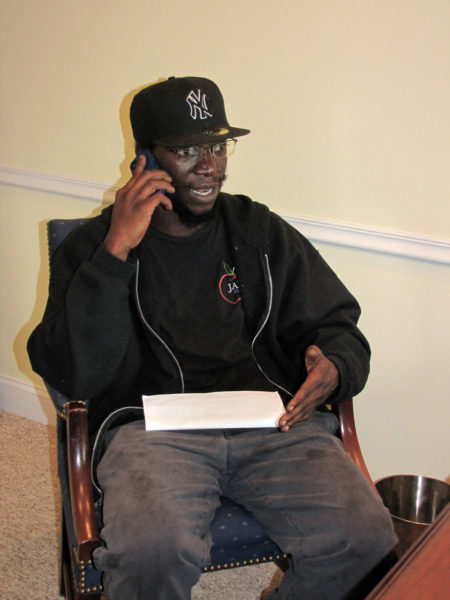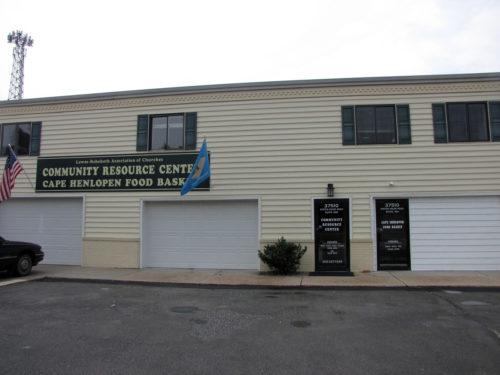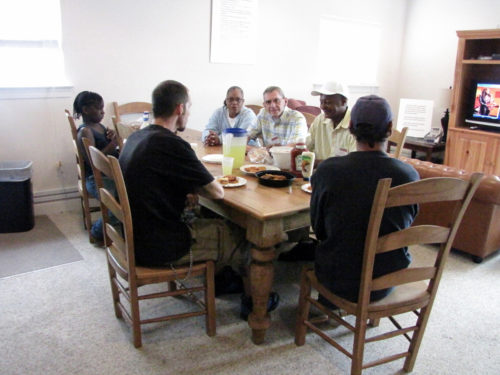Delaware center aids needy, attacks underlying poverty issuesPosted Oct 4, 2013 |
|

Raheim Pope fields a phone call about rental assistance for his new apartment. Pope sought help at the Community Resource Center in Rehoboth Beach, Delaware, to secure the funds he needed to meet a payment deadline after he had to move out of his previous rental. Photo/Sharon Sheridan
[Episcopal News Service] Long living on poverty’s edge, he’s tipped again into homelessness. Kevin, now 51, was employed for 30 years – even ran his own painting business for a while – but now scrambles for short-term landscaping or construction jobs. He lives in a tent in the woods, one of many homeless campers along Route 1 in Lower South Delaware, hoping for warmer quarters come winter.
“It’s gonna get better,” he says. “You’ve got to keep a positive look at things. You’ve got to keep your head up.”
One of the places he finds hope and help is at the Community Resource Center, just off the highway in Rehoboth Beach. Opened in April 2011, it serves vulnerable individuals and families in the Cape Henlopen School District: assessing their needs; providing financial assistance and help with issues such as budgeting, and health and employment information; and linking them to state services and other resources. Besides connecting clients with various social services and funding, the center offers an emergency food cupboard and a place to use a computer, relax and socialize, eat a hot lunch, take a shower and launder clothes.
Staffed almost entirely by trained volunteers, the center is sponsored by the Lewes-Rehoboth Association of Churches, which includes 20 churches in the Rehoboth, Lewes and Milton areas of southern Delaware. Its launch marked the next step in a progression of outreach services in a region marked by both the wealth of a resort area and the poverty of many who live and work there, or wish to.
Preventing and breaking cycles of addiction, homelessness, incarceration and hopelessness by providing temporary or emergency help always has been a key mission of the association, said the Rev. Jeff Ross, association president and rector of St. Peter’s Episcopal Church in Lewes.
“The clergy association came first, and then they decided to take on running the thrift store to generate money to do at that time what we called Lend-a-Hand. And Lend-a-Hand morphed into the Community Resource Center,” he said. The center has served more than 4,000 individuals and families, providing more than $300,000 for emergency housing, long-term housing assistance, utility aid and other needs such as medicine, car repairs and furniture, he said.
Retired social worker Irene Simpler, a parishioner of All Saints’ Episcopal Church in Rehoboth Beach who died in July, founded Lend-a-Hand. “The goal was to give people a hand up,” said the Rev. Max Wolf, rector of All Saints’ and of St. George’s Chapel, Harbeson.
A core of 12 to 25 volunteers from various churches worked to help people stay in their homes, paying outstanding bills and finding food for their families, he said. Doing much of their work by telephone, they came to realize that “there wasn’t enough interaction and support for people.”
Opening the center consolidated and increased the support, providing a sort of “one-stop-shopping” for services, Ross said. A state social worker operates out of the center one day a week, easing the travel burden on clients who previously had to take several buses to travel 10 to 15 miles to a state office.

Located just off Route 1 in Rehoboth Beach, Delaware, the Community Resource Center sponsored by a 20-member local church association has served more than 4,000 people and families and provided more than $300,00 in assistance since opening in April 2011. A food bank also operates at the site. Photo/Sharon Sheridan
At the new location, “We could do a much better job of assessing people’s needs,” said St. Peter’s member Bennett Connolly, founding director of the center. “We were much more accessible.” Their monthly clientele rose from about 30 through Lend-a-Hand to 120 at the center.
A case manager, one of four paid staff, works 15 hours a week. “His primary job is to work with the homeless people,” who constitute about 20 percent of the center’s clients, Connolly said. “Most of the clients are those families that are just on the edge of being homeless, having their electricity turned off.”
Raheim Pope, 31, arrived at the center seeking emergency housing funds one day in late August. He’s employed and raising a 5 ½-year-old daughter whose mother was killed in a Route 1 car accident three years ago.
“I don’t spend a lot of money. I spend the majority of my money on my daughter,” he said.
With the lease ending on their previous rental, he found a new apartment but was going to lose the security deposit if he couldn’t pay the first month’s rent in time. He knew he would have enough money to cover it, including his own and his girlfriend’s paychecks and his daughter’s Social Security payment, but not until after the deadline passed. The center said it could provide some money, matched by funds from another agency.

Clients and staff gather for lunch at the Community Resource Center, sponsored by the Lewes-Rehoboth Association of Churches in southern Delaware. The center is run mostly by trained volunteers and largely financed by an association-operated thrift shop. The community also has offered support; the local PNC bank, for example, donated furniture when it remodeled. Photo/Sharon Sheridan
This was Pope’s first time visiting the center. He said he tried to set a good example for his daughter by working hard to be self-sufficient.
“I don’t want to ask a bunch of people for stuff,” he said. “There’s no way around hard work. I’d be kind of a hypocrite if I didn’t try on my own.”
Dawnya Bland, almost 20, visited the center three weeks after her father died, seeking help finding funds to return for her second year of college in Dover.
“I came here for help with the money to move into school,” she said. “Overnight, they came up with $1,200. It’s for the first month’s payment for my tuition.”
Another student, 20-year-old Taylor Harris, said she also was looking for school funding assistance. Even while switching from an out-of-state to a less-expensive local college, she said, “School’s going to be expensive.”
On this day, she stopped in the center to use the computer to apply for a job.
“The staff here, they’re great,” she said. “It’s a good resource for a lot of people. They offer a lot here.”
Volunteer-led ministry
About 50 community members volunteer at the center, said Co-director Larry Beach.
Other volunteers help with the on-site food pantry and at the nearby thrift store that provides much of the center’s funding. “It takes about 100 volunteers plus to run the thrift store,” Ross said.
Beach and Wally Johnson, who coordinates the center’s public relations, were sitting in the pews at St. George’s when Wolf announced plans for establishing the resource center.
“Wally and I looked at each other in the middle of the service and said, ‘I’ve never been called before, and I feel like I’m being called,’” Beach recounted. “It was true for me.”
Volunteers come with a desire to “give back,” he said.
They stay, said Day Manager Carol Wzorek, because “we see results right away.”
“It’s a hard place at times,” she added.
Often, new clients arrive in tears, said receptionist Eleanor Whaley. “You try to console them. That’s part of what I do. By the time they’re going out the door, they’re hugging me. Their tears are dried up.”
Working there has dried some of her tears, too. “When I came, I was suffering from the loss of my son,” Whaley said. “It kind of pulled me out of that rut. It has been a healing process for myself … to also be able to help somebody else.”
Clients range in age from 19 to 80, Wzorek said. She recalled one woman who was living in a motel with her children. “She tried to convince them they were on vacation.”
Her husband was in jail; she was unemployed and came from generations of poverty. The center helped her find work and to pay first for the motel, then for a rental after negotiating on her behalf with the landlord. Then the family moved into a Habitat home.
Not only is the client doing well, but she’s also become a role model for her three children, Wzorek said. “That’s an amazing turnaround for somebody who really had nothing but will and a desire to do better.”
The woman now is a center board member, Beach said, noting that they work to make sure clients are treated as partners.
“I always ask the person coming in what they can contribute to solving the problem,” Wzorek said.
The economic slowdown and a lack of funding for social programs under federal budget sequestration have increased people’s need for assistance, Beach said.
But geography also drives the need, with non-skilled jobs disappearing during the “off season” in the resort area, Wzorek said. “We have people who are in a cycle. It’s very hard for them to break out of it.”
Even if you have a job, “if you miss a day or two or work, you’re gone,” she said. “It’s a very unstable work environment.”
“Housing’s expensive and very limited,” added Co-director Janis Bordi. People visiting the area don’t realize that “the reason they can sit in a restaurant and be served is because of poor people.”
And they don’t notice the tents people live in near the local Wal-Mart, Johnson said. “People don’t see that. They see the million-dollar homes.”
Even the seasonal jobs aren’t as easy to come by as they used to be, Kevin said. “Every year it’s the same thing. Wintertime comes, and your work gets slow. Now it’s just spreading through the year; too many people down here now, and not enough jobs. Exchange students take up 60 percent of the restaurant jobs. It’s a good program that they have, but it takes from the locals.”
And a new wave of older clients may be rolling in.
“We’re preparing ourselves for a new type of client,” Beach said. “Our area’s growing with retirees that have been hit by the economy.”
Appearances can deceive, he noted. If you see someone driving a new Cadillac, “they might have trouble paying the electric bill. This is a new phenomenon that the world has to be prepared for.”
“I have a friend,” Johnson said, “who was a lawyer on K Street in Washington, D.C. He’s waiting tables right now in a restaurant in Rehoboth. He and his wife lost everything.”
While helping individual clients and their families, the center’s volunteers also tackle larger issues. Working together at a centralized location has allowed them to identify and work together to try to resolve underlying problems such as inadequate public transportation.
Much of the area’s public transportation stops when tourist season ends. “As jobs disappear, so does transportation,” Wzorek said.
A 10-mile trip becomes a lengthy ordeal. “To get from your home in Milton to Rehoboth takes two hours and 35 minutes by bus,” Johnson said.
“We are trying to address those issues,” he said. Enable people to get to a job site and “we’re going to see a decrease in homelessness,” he said. “They want to work.”
Working together gives the association members added clout. “When you have 20 churches come together, they’re a pretty powerful advocate,” Beach said.
The center also partners with other organizations and can negotiate in a way clients can’t. The Delmarva electric company, for example, “will work with us in a way they will not work with an individual client,” Wzorek said. “Landlords will talk to us.”
And even when they can’t provide the assistance a client is seeking, they help as they can.
“We had a woman here yesterday. We couldn’t help her, but we could give her a new pair of shoes,” Wzorek said.
Although the center is sponsored by a church association, there is no proselytizing, Wolf said. “We listen to people and respect their dignity.”
“We really see our role as meeting people where they are,” Ross said. “Our ministry to them is to share the love of Christ with them and hope that by helping them get back up on their feet that they can get in touch with who they are as spiritual beings and rebuild their lives within that context. We do have folks who have joined our congregations because of that experience … but we also don’t use this as a time to force someone into the spiritual identity just so they can get their basic human needs met.”
Noted Bordi, “People a lot of times have to drop their pride to come in here, and that’s hard. When they leave here, they’ve got their pride back.”
— Sharon Sheridan is an ENS correspondent.

Social Menu